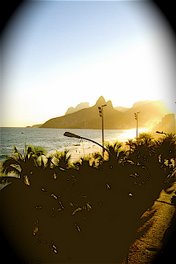
The video is way down-- please scroll down the blog; sorry.
Domingo no Parque
by Gilberto Gil, performed by Gilberto Gil, Os Mutantes, Rogerio Duprat conducts orchestra.
Domingo no parque__ intro w/ brass and berimbau, the latter used in capoeira. Capoeira is a type of martial art brought to Brazil by the slaves, who mimicked play when in fact they were practicing fighting coups. We use the verb to play when talking about capoeira. The rhythm of Domingo no Parque is pretty much one of a capoeira "play." Capoeira is "played" at the rhythm of the berimbau and other percussion instruments.
The king of playfulness, hey José -- The king of confusion, hey João,
One worked at the street market, hey, José -- the other in construction, hey, João
The introduction of the lyrics is matter-of-fact, a narrative in a past we would use with "used to" not necessarily meaning no longer does, simply an action/state taking place and incomplete in the past.
Last week, on the weekend, João decided not to fight. On Sunday afternoon he left in a hurry and didn't go to Ribeira to play -- Capoeira--He didn't go to Ribeira --He went on a date
In this part of the narrative, we see a switch in João's behavior. We can also observe the alternating positive/negative pairing of sentences: not to fight, left. didn't go, to play; didn't go, he went...
José as usual on weekends put away his market tent and disappeared. He went on Sunday for a promenade in the park near Boca do Rio -- At the park it was that he noticed--Juliana--That's when he saw
José follows his pre-established ritual. Notice he notices and then he sees
Juliana riding the Ferris wheel with João--A rose and icecream in her hand-- Juliana, his dream, an illusion-- Juliana and his friend João--The thorn of the rose hurt Zé-- And the icecream froze his heart
At this point the narrative becomes dreamlike, filled with imagery and clipped syntax, that is, fragments. The image of his sweetheart with his best friend. The red images of the ice cream and rose. The displacement of his anger towards the symbolic strawberry ice cream and thorny rose, both red. Red like blood.They hurt him, not Juliana or João.
The icecream and the rose --hey, José--the rose and the icecream--hey, José--Woah, dancing in the chest, oh, José-- Of funloving José, oh, José
From now on the mental confusion in José's mind is reflected in the way ice cream and rose switch places in the sentences, spinning as Juliana and João spin during their ride.
The ice cream and the rose, oh José--The rose and the icecream-oh José--Whoah, spinning in the mind--oh, José--of playfull José --oh, José
Juliana spinning--whoah spinning--Whoah on the Ferris Wheel--whoah spinning-- Woah on the Ferris Wheel--whoah spinning--Friend João--João
It's strawberry icecream--it is red--Whoah spinning, and the rose--it is red--whoah spinning, spinning--it is red--Whoah, spinning, spinning--Watch for the knife!
Look at the blood on a hand -- hey, José--Juliana on the ground--hey José--Another body lying--hey, José -- his friend, João -- hey, José
The climate goes on a crescendo, made stronger by the repetition of the "red" words, ice cream and rose, and the spinning, both of the Ferris Wheel carrying Juliana and João at the end of their rides and the spinning going on in José's mind. The highest musical moment is the yell, Watch for the knife!
The song resumes its hypnotic capoeira rhythm to communicate the presence of blood on a hand and the two inert bodies, Juliana and fried João's.
Tomorrow there will be no fair--hey, José -- There is no more construction--hey, João--No more playing, hey José--No confusions anymore, hey João
Os Mutantes somewhat serve as a Greek choir, fragmented as well, intervening only at the end of musical phrases, or repeating the names, oh José, oh João.
Finally, it is fascinating to realize the narrative once in the past, switches to the present, at the moment of the murder, and then to the future, or lack of any future, sung in lamenting voices before a grand finale, with brass and boos.
The song can easily be pictured in anyone's mind. Towards the end of December, 1968, Gil and Caetano went to London. Os Mutantes were left, at a quite young age, in charge of the revolutionary Tropicália days.
While Rita Lee has been busy about a book in São Paulo, the boys spend this weekend in Chicago, another sold-out date. There is a venue with few seats left in Miami. Tomorrow, "Língua" recorded by Caetano and Elza Soares for "Velô" here in a YouTube video. I'll provide translation and a little analysis of the song in the Tropicália context.
Tropicália
Domingo no Parque
analysis lyrics music
Os Mutantes Gil
Gil Caetano leave
responsibility Os Mutantes


1 comment:
I think the post turned out pretty decent, do you?
Post a Comment